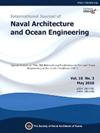基于深度学习的燃油消耗预测模型的船舶使用性能退化估计
IF 3.9
3区 工程技术
Q2 ENGINEERING, MARINE
International Journal of Naval Architecture and Ocean Engineering
Pub Date : 2025-01-01
DOI:10.1016/j.ijnaoe.2025.100666
引用次数: 0
摘要
提出了一种基于快速连接深度神经网络的船舶燃油消耗预测模型,用于船舶使用性能退化(SOPD)估计。该模型利用一艘原油油轮在21个月期间的运行和环境数据来预测FOC和评估SOPD。作为FOC预测模型的新特征,引入了累积锚定效应,捕捉了在温暖水域长时间锚定引起的生物污染的影响。在本研究中,SOPD被认为是由于退化导致的行程段所需的额外燃油率,通过比较有和没有累积锚定效应的预测FOC来估计。在FOC预测模型的基础上,给出了基于增加行程的SOPD估计。提出的SOPD估计方法为航运公司优化运营计划和提高燃油效率提供了有价值的见解。本文章由计算机程序翻译,如有差异,请以英文原文为准。
Estimation of ship operational performance degradation using deep-learning-based fuel oil consumption prediction models
This paper proposes a novel method for estimating ship operational performance degradation (SOPD) using a fuel oil consumption (FOC) prediction model based on deep neural networks with shortcut connections. The model leverages operational and environmental data from a crude oil tanker over a 21-month period to predict FOC and assess SOPD. A cumulative anchoring effect is introduced as a new feature of the FOC prediction model, capturing the impact of biofouling caused by prolonged anchoring in warm waters. In this study, SOPD is considered the additional fuel rate required for a journey leg due to degradation, which is estimated by comparing predicted FOC with and without the cumulative anchoring effect. The SOPD estimation is illustrated according to increasing journey legs based on the FOC prediction models. The proposed SOPD estimation method provides valuable insights for shipping companies to optimize operational schedules and improve fuel efficiency.
求助全文
通过发布文献求助,成功后即可免费获取论文全文。
去求助
来源期刊

International Journal of Naval Architecture and Ocean Engineering
ENGINEERING, MARINE-
CiteScore
4.90
自引率
4.50%
发文量
62
审稿时长
12 months
期刊介绍:
International Journal of Naval Architecture and Ocean Engineering provides a forum for engineers and scientists from a wide range of disciplines to present and discuss various phenomena in the utilization and preservation of ocean environment. Without being limited by the traditional categorization, it is encouraged to present advanced technology development and scientific research, as long as they are aimed for more and better human engagement with ocean environment. Topics include, but not limited to: marine hydrodynamics; structural mechanics; marine propulsion system; design methodology & practice; production technology; system dynamics & control; marine equipment technology; materials science; underwater acoustics; ocean remote sensing; and information technology related to ship and marine systems; ocean energy systems; marine environmental engineering; maritime safety engineering; polar & arctic engineering; coastal & port engineering; subsea engineering; and specialized watercraft engineering.
 求助内容:
求助内容: 应助结果提醒方式:
应助结果提醒方式:


